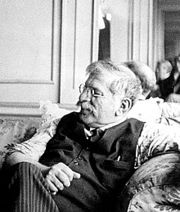Magnus Hirschfeld
Early contributions to sexology
Hirschfeld developed the theory of a third, "intermediate sex" between men and women. He was interested in the study of a wide variety of sexual and erotic urges, at a time when the early taxonomy of sexual identity labels was still being formed. His scientific work extended that of Karl Heinrich Ulrichs and influenced Havelock Ellis and Edward Carpenter.
Gay rights activism
As a young man, Hirschfeld had lived in Paris and worked as a journalist. His subsequent career successfully found a balance between medicine and writing. After several years as a general practitioner in Magdeburg, in 1896 he issued the anonymous pamphlet Sappho and Socrates, on homosexual love. In 1897, Hirschfeld founded the Scientific-Humanitarian Committee with Adolf Brand, Benedict Friedlander and other leaders of Der Eigene, a homosexual campaign and publication. The group aimed to undertake research to defend the rights of homosexuals and to repeal Paragraph 175 (see "Paragraph 175" below), the section of the German penal code that since 1871 had criminalized homosexuality. They argued that the law encouraged blackmail, and the motto of the Committee, "Justice through science", reflected Hirschfeld's belief that a better scientific understanding of homosexuality would eliminate hostility toward homosexuals. He was a tireless campaigner and became a well-known public figure.
Magnus Hirschfeld in 1900
DVD cover of Richard Oswald's 1919 film Different From the Others, Anders als die AndernWithin the group, some of the women, as well as Friedlander, scorned Hirschfeld's analogy that homosexuals are like cripples. They argued that society might tolerate or pity cripples, but never treat them as equals. They also disagreed with Hirschfeld's (and Ulrich's) view that male homosexuals were by nature womanish - Brand, Friedlander and others would later leave the Scientific-Humanitarian Committee and form their another group, Gemeinschaft der Eigenen, which argued that male-male love is a simple aspect of virile manliness rather than a special condition.
However, the Scientific-Humanitarian Committee, under Hirschfeld's leadership, managed to gather over 5000 signatures from prominent Germans for a petition to overturn Paragraph 175. Signatories included Albert Einstein, Hermann Hesse, Thomas Mann, Rainer Maria Rilke and Leo Tolstoy, but no one admitted publicly to being homosexual themselves.
The bill was brought before the Reichstag in 1898, but was only supported by a minority from the Social Democratic Party of Germany, prompting a frustrated Hirschfeld to consider the controversial strategy of "outing" - that is, forcing some of the prominent law-makers who had remained silent out of the closet. The bill continued to come before parliament, and eventually began to make progress in the 1920s before the takeover of the Nazi party obliterated any hopes for reform.
In 1921 Hirschfeld organised the First Congress for Sexual Reform, which led to the formation of the World League for Sexual Reform. Congresses were held in Copenhagen (1928), London (1929), Vienna (1930), and Brno (1932).
Hirschfeld was both quoted and caricatured in the press as a vociferous expert on sexual manners, receiving the epithet "the Einstein of Sex". He saw himself as a campaigner and a scientist, investigating and cataloging many varieties of sexuality, not just homosexuality. He coined the word "transvestism," for example. Although he preferred to project himself as an objective researcher and scientist, Hirschfeld himself was gay and a transvestite, and participated in the gay subculture of Germany. For these activities he gained the epithet "Tante Magnesia" - "Auntie Magnesia."
Paragraph 175
Paragraph 175 (known formally as §175 StGB; also known as Section 175 in English) was a provision of the German Criminal Code from 15 May 1871 to 10 March 1994. It made homosexual acts between males a crime, and in early revisions the provision also criminalized bestiality.
The statute was amended several times. The Nazis broadened the law in 1935 and increased §175 StGB prosecutions by an order of magnitude; thousands died in concentration camps, regardless of guilt or innocence. East Germany reverted to the old version of the law in 1950, limited its scope to sex with youths under 18 in 1968, and abolished it entirely in 1988. West Germany retained the Nazi-era statute until 1969, when it was limited to "qualified cases"; it was further attenuated in 1973 and finally revoked entirely in 1994 after German reunification.
Chat rooms • What links here • Copyright info • Contact information • Category:Root
